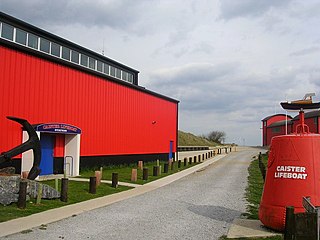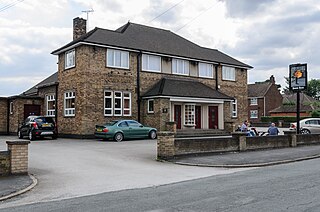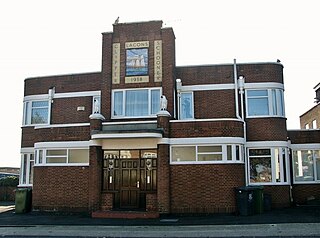
Great Yarmouth, often called Yarmouth, is a seaside town and unparished area in the Borough of Great Yarmouth in Norfolk, England; it straddles the River Yare and is located 20 miles (30 km) east of Norwich. A population of 38,693 in the 2011 Census made it Norfolk's third most populous. Its fishing industry, mainly for herring, shrank after the mid-20th century and has all but ended. North Sea oil from the 1960s supplied an oil-rig industry that services offshore natural gas rigs; more recently, offshore wind power and other renewable energy industries have ensued.

Blakeney is a coastal village and civil parish in the English county of Norfolk. Blakeney lies within the Norfolk Coast AONB and the North Norfolk Heritage Coast. The North Norfolk Coastal Path travels along its quayside. The village is 21.1 mi (34 km) north west of Norwich, 4.6 mi (7.4 km) NNW of the larger settlement of Holt, 11.5 mi (18.5 km) west of Cromer and 112 mi (180 km) NNE of London.
Caister-on-Sea, also known colloquially as Caister, is a large village and seaside resort in Norfolk, England. It is close to the large town of Great Yarmouth. At the 2001 census it had a population of 8,756 and 3,970 households, the population increasing to 8,901 at the 2011 Census.

Sir John Fastolf was a late medieval English landowner and knight who fought in the Hundred Years' War. He has enjoyed a more lasting reputation as the prototype, in some part, of Shakespeare's character Sir John Falstaff. Many historians argue, however, that he deserves to be famous in his own right, not only as a soldier, but as a patron of literature, a writer on strategy and perhaps as an early industrialist.

The Anchor Inn is one of the oldest public houses in Digbeth, Birmingham, England, dating back to 1797. The current building was constructed in 1901 to a design by James and Lister Lea for the Holt Brewery Company. The terracotta on the façade is believed to have come from the Hathern Station Brick and Terracotta Company of Loughborough. On 10 December 1991 the building was designated Grade II listed building status, along with other nearby pubs such as the White Swan. The pub won the Campaign for Real Ale (CAMRA) award of 'Regional Pub of the Year' in 1996/7, 1998/9, 2003/4 and again 2007/8. The pub was taken over by Julian Rose-Gibbs in 2016, after being in the hands of the Keane family who ran it for 43 years.

Corton is a village and civil parish in the north of the English county of Suffolk. It is 3 miles (4.8 km) north of the centre of Lowestoft in the East Suffolk district. The village is on the North Sea coast with the county border with Norfolk to the north. It is a seaside holiday centre, with a number of facilities for visitors. Great Yarmouth is 6 miles (9.7 km) to the north.

New Buckenham is a village and civil parish in the English county of Norfolk.

Winterton-on-Sea is a village and civil parish on the North Sea coast of the English county of Norfolk. It is 8 miles (13 km) north of Great Yarmouth and 19 miles (31 km) east of Norwich.

Heydon is a village and civil parish in Norfolk, England.

The Caister lifeboat disaster of 13 November 1901 occurred off the coast of Caister-on-Sea, Norfolk, England. It took place during what became known as the "Great Storm", which caused havoc down the east coasts of England and Scotland.

Caister Volunteer Lifeboat Service, or Caister Lifeboat, is based at Caister-on-Sea in Norfolk, and operates one of only three offshore lifeboats in the UK that are independent of the RNLI.

St Mary's Church is a Roman Catholic Parish church in Great Yarmouth, Norfolk. It is situated on Regent Road in the centre of the town. It was originally built by the Society of Jesus in the late 1840s and it is now administered by the Diocese of East Anglia. The architect was Joseph John Scoles who also designed the Anglican St Mary's church in the Southtown area of Great Yarmouth and it is a Grade II* listed building.

The Daylight Inn is a Grade II listed public house at Station Square, Petts Wood, Orpington, in the London Borough of Bromley.
The Centurion is a grade II listed public house in Twerton, Bath, England. It was built in 1965 and the outside features a large bronze Roman centurion.

Arthur William "Billy" Ecclestone was an English architect and the chief surveyor for the Norfolk brewers Lacons in the first half of the twentieth century. In that capacity, he was responsible for the design of a number of their public houses, two of which are now listed buildings with Historic England. He was also a local councillor, justice of the peace, and historian of Great Yarmouth.

The Queen Bess is a grade-II-listed (historic) public house in Scunthorpe, Lincolnshire, England. It opened in 1959 and is one of the few remaining examples of postwar pubs that have not been altered, closed down or demolished.

The Iron Duke is grade II listed public house in Great Yarmouth, Norfolk, England. It was designed by A. W. Ecclestone in the late 1930s and completed in 1948. Building work started in the Art Deco period; however, work was halted due to the outbreak of World War II. Despite being unfinished, a Special Licence was granted so that the Iron Duke could serve the troops stationed locally. The bars in the pub are made from teak taken from the WWI Battleship HMS Iron Duke, which was captained by Admiral John Jellicoe at the Battle of Jutland. The pub was decorated with murals of the battle. The pub, listed as Grade II, now has a campaign to be restored. The pub is owned by Bourne Leisure, who has kept the pub closed for twenty years to prevent a rivel venue from opening next to their camp. Ecclestone was a skilled architect, and Lacons employed had an army of master builders. Everything was done in-house. The Iron Duke was built as their flagship pub.

The Clipper Schooner is a public house at 19 Friars Lane, Great Yarmouth, in England. It was designed by A. W. Ecclestone in 1938 for Lacons brewers, for whom Ecclestone was the chief surveyor. It has a decorative tiled panel showing a sailing ship that the Tile Gazetteer describe as typical of Ecclestone's practice in his modern pub designs.

Whitefriargate is a pedestrianised street in the Old Town area of Kingston upon Hull, in the East Riding of Yorkshire, England. During the 20th century, it was one of the main shopping streets in the city centre, but some of the major stores have closed down, which has been attributed to out of town shopping centres. However, the Street still provides a useful link to and from the old town of Hull.

















